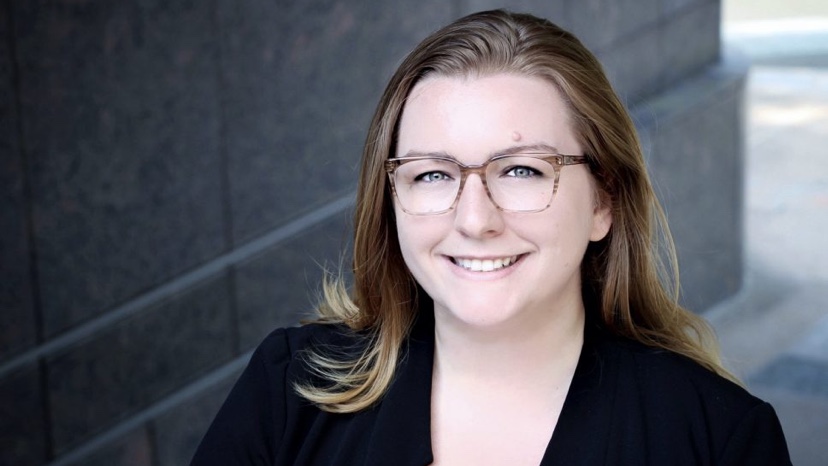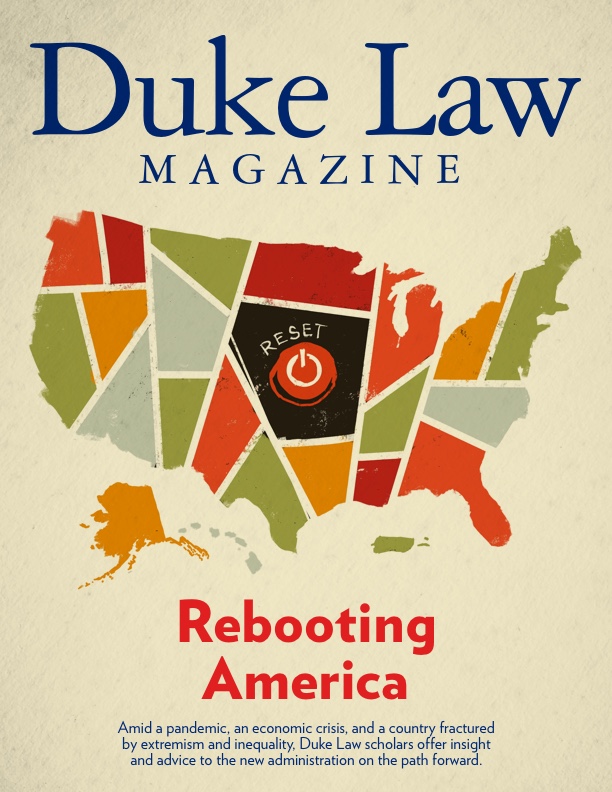
Student Profile
Moved to help
Christine Mullen ’21 empowers others through volunteer, pro bono, and volunteer service.
Christine Mullen ’21 probed her interest in studying law by working as a paralegal at Cravath, Swaine & Moore in New York following her 2016 graduation from Brown University. It snapped into focus when, in 2017, with President Donald Trump’s executive order banning nationals from seven majority Muslim countries from entering the U.S., she saw news images of lawyers assisting stranded travelers.
“I remember feeling like that was such an empowering thing, to be the one who can do something when people feel helpless,” she said. “That was the moment I said, ‘I’m definitely going to go to law school.’”
Hailing from a small town outside Worcester, Mass., Mullen, who majored in political science at Brown, has long been involved in peer leadership and community service. Now on the brink of attaining her JD, she has made empowering others part of her mission as a law student through her involvement in organizations that help immigrants and refugees, victims of domestic violence, and other women in the legal profession.
During the summer before law school Mullen interned at the North Carolina Coalition Against Domestic Violence and in her first year she was involved with the Duke Immigrant and Refugee Project. She spent her 1L summer in Akin Gump’s highly-selective Pro Bono Scholar Program, working for Her Justice, an organization that provides free legal help to low income women in New York City.
As president of the Women Law Students Association at Duke Law she led the organization to a Duke Bar Association award last April for its work in building relationships, including initiating an allies program with other Duke Law community members and hosting a day-long open house last February for 100 undergraduate women from a dozen different institutions. The latter idea came from her post-college experience as a paralegal, where she noticed that most of the support staff were women, and most of the partners and senior attorneys were men.
“There are so many women who are interested in the legal profession and work at these jobs for years, but they are not doing the high-paying work or they’re not pursuing their JDs for some reason,” Mullen says. “The whole purpose of the open house was to get women to sit in those seats and think, ‘I belong in this seat’ and empower them to apply to schools like Duke Law.”
Immigration work is a focus
At Duke Law Mullen has handled a wide range of immigration issues, including working on asylum cases for domestic violence survivors, helping detainees prepare for interviews with immigration officials, and assisting with Deferred Action for Childhood Arrivals (DACA) renewals and reinstatements. She spent two semesters in the Immigrant Rights Clinic, where she advocated for a client’s relief from removal and drafted an opening brief for the Fourth Circuit after a case was denied by the Board of Immigration Appeals. While working as a 2L summer associate at Akin Gump, she continued to assist Clinical Professor Kate Evans with research for the clinic, including for an amicus brief co-authored with Amanda Ng ’20 and Zachary Pollack JD/LLM ’22 that was submitted to the Ninth Circuit Court of Appeals on behalf of national justice organizations challenging, on Fourth Amendment grounds, the detention by local law enforcement agencies of individuals suspected of immigration violations.
“Both merits counsel and amici were blown away with their work,” Evans said of the students’ brief.
Evans also served as advisor for Mullens’s note, “Preclusion of Exclusion: How Many Bites Does DHS Get at the Deportation Apple?” 70 Duke Law Journal 217-259 (2020). In it, Mullen argues that the common law doctrine of res judicata should apply broadly and uniformly in deportation proceedings and bar relitigation of convictions found not to warrant deportation.
Mullen is grateful for Evans’s support and instruction: “She’s been really important in the development of my writing skills, through brief writing, working on iterations, having her edit my work and having dialogues about what working what’s not, the reasons why we are framing our argument one way instead of something that might seem more intuitive.”
Mullen is paying that forward as a teaching assistant for Legal Analysis, Research, and Writing and as managing editor of the Duke Law Journal.
“Christine brings her top notch legal reasoning and writing skills to every project,” Evans says. “In the course of working with her in the Immigrant Rights Clinic, Christine developed cutting edge arguments on the availability of equitable defenses in administrative proceedings before the Board of Immigration Appeals and the Fourth Circuit. She pairs her formidable analytic talent with compassion and a commitment to partnership with her clients.”
Mullens’s ability to build trust with vulnerable clients was critical to helping them with their cases, she adds.
Not mourning the pre-pandemic life
Mullen plans to pursue a career in litigation and following graduation will return to Akin Gump where, as a former pro bono scholar, she will sit on the firm’s pro bono committee. She and her partner, a student at Duke’s Fuqua School of Business, look forward to returning to New York with the puppy they adopted last year.
Mullen feels fortunate to have built a strong community at Duke Law and secured her job before COVID-19 restrictions ended most in-person interactions. She is also grateful to the many Duke Law faculty members who put special care into making virtual classes engaging, especially Bernard M. Fishman Professor of Law Samuel Buell and Candace M. Carroll and Leonard B. Simon Professor of Law Lisa Kern Griffin. Buell’s Corporate Crime class sparked a new interest in white-collar crime, and Griffin’s Evidence class was so compelling that Mullen signed up for her spring teaching of Criminal Procedure.
Another of Mullen’s favorite professors is David W. Ichel Professor of Law Neil Siegel for the clarity, she says, with which he conveys difficult material and for the poignant memories he shared of his time clerking for the late Supreme Court Associate Justice Ruth Bader Ginsburg.
Although Mullen and her classmates have spent half their Duke Law experience online, missing such milestones as Bar Review and the Barristers Ball, “I don’t see a lot of people mourning what we’ve lost,” she says. “I think that’s a very positive and healthy attitude to have about the whole situation.
“It’s a symbol of our resilience, and I think going through law school during this time can make us feel more prepared for whatever else life might throw at us.”

